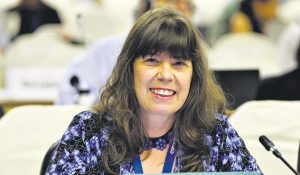As first week of negotiations at the sixteenth session of the Conference of the Parties (COP16) to the UN’s Convention on Biological Diversity (CBD) comes to an end, civil society including climate justice, Indigenous Peoples, and Youth groups are encouraging CBD to continue its leadership in recognising and addressing the dangers of geoengineering.

The CBD is said to have been a global leader since 2010, at COP10 it adopted a historic de facto moratorium on geoengineering, reaffirming it at COP13 in 2016.
“CBD understood early that climate change has a large impact on biodiversity and that some of the measures to ‘tame’ the climate crisis could in fact worsen it. Therefore, CBD took a groundbreaking decision calling for a moratorium on climate geoengineering. Now that there has been an explosion of risky geoengineering proposals aiming to alter marine and land ecosystems, with serious environmental and social impacts, CBD needs to reaffirm precaution,” said Silvia Ribeiro, Latin America Director for ETC Group.
As climate and biodiversity crises continue to deepen, it is essential that CBD uphold its precautionary approach to geoengineering which can have wide reaching impacts on peoples, communities, biodiversity and climate.
Mary Church, Centre for International Environmental Law (CIEL), said: “Geoengineering is a dangerous distraction from the real solutions to the climate crisis – it does nothing to tackle the root causes of climate change and instead gives the illusion that there is a silver bullet or quick fix out there, if only we can find it. If deployed at scale these inherently unpredictable technologies would have profound and potentially irreversible effects on biodiversity and communities.
“Impossible to test for their intended impact on the climate except through large-scale deployment, geoengineering proposes turning the Earth into a risky laboratory. States must take steps to protect biodiversity and prevent the normalisation of geoengineering in climate discourse and policy, including by preventing outdoor geoengineering experiments.”
Geoengineering also brings new risks to the lives and livelihoods of Indigenous Peoples, and traditional communities and fisherfolk who rely on these ecosystems.
Adrienne Aakaluk Titus, Indigenous Environmental Network (IEN), said: “The very existence of the world depends on the rich biodiversity of ecosystems that have been maintained by Indigenous Peoples since time immemorial. Our land is not your science laboratory. It is imperative to make an Indigenous led just transition. To step away from extractive industry and false solutions like geoengineering, climate manipulation that support capitalism. We must put Indigenous stakeholders to the forefront to ensure a healthy Mother Earth for future generations.”
Youth groups are concerned about the lack of transparency around the risks and consequences of geoengineering as it gets pushed as a “fix” for the climate and biodiversity crises.
“Youth deserve honest information, not false promises, about these risky technologies. We demand a global respect for the geoengineering moratorium, with clear protocols to stop all experiments. Communities harmed by these tests have spoken, and we reject tech companies’ false promises and false solutions to ‘solve’ the climate change while profiting from the same systems that caused it. Real solutions come from grassroots communities, not in labs with geoengineers,” added Alejandro Jaimes, Alliance of Non Governmental Radical Youth (ANGRY).
